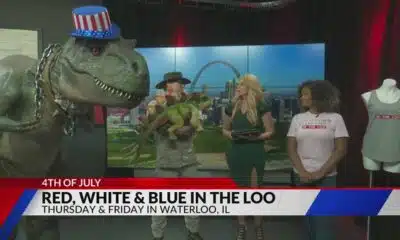News from the South - Virginia News Feed
Virginia schools face federal scrutiny over parental rights laws
by Nathaniel Cline, Virginia Mercury
March 31, 2025
The U.S. Department of Education is putting Virginia schools on notice, warning they could lose federal funding and face further investigation if they fail to comply with parental rights laws.
On Friday, the department directed Virginia and other states to submit documentation proving compliance with the Family Educational Rights and Privacy Act (FERPA) and Protection of Pupil Rights Amendment (PPRA), specifically regarding key “priority concerns” by April 30.
These concerns include parental rights to inspect and review education records, student safety, annual notification of rights, military recruiter access, and overall compliance.
The directive follows reports that state educational agencies and school divisions are hiding critical information from parents, such as details about a child’s gender transition, or their mental and physical wellbeing.
The Virginia Department of Education said in a statement that it will continue to review all guidance and correspondence from USED to ensure complete compliance.
“Governor Youngkin’s first and second executive orders reiterated and emphasized parents’ rights and directed the removal of inherently divisive concepts from department materials,” the statement said.
“The Department opened its first Office of Parental Engagement in the Fall of 2023 and we maintain multiple model policies which center the rights of parents, including the Model Policies on Privacy, Dignity and Respect for All Students, and the Model Polices on Sexually Explicit-Materials, which allows for parental review of course materials and for accommodations to be made if the parent objects under the law.”
Meanwhile, U.S. Secretary of Education Linda McMahon directed the SPPO to investigate California and Maine for similar violations, accusing the states of enacting policies that prevent parents from accessing records related to their child’s gender transition.
The federal agency emphasized that laws like FERPA and PPRA override state policies.
“Parents are the most natural protectors of their children. Yet many states and school districts have enacted policies that imply students need protection from their parents,” McMahon said in a March 28 statement.
The department is accusing states and school districts of turning “the concept of privacy on its head” by prioritizing government officials’ concerns over those of parents and families. McMahon noted that moving forward, the correct application of FERPA will be to “empower all parents to protect their children from the radical ideologies that have taken over many schools.”
In Virginia, Gov. Glenn Youngkin has consistently made parental rights a cornerstone of his administration. Along with his Republican colleagues, Youngkin has leaned on a state law asserting that “a parent has a fundamental right to make decisions concerning the upbringing, education, and care of the parent’s child.”
His administration has enacted several measures to reinforce these rights, including executive orders that require parents to be notified about drug overdoses and make mask-wearing optional.
The governor also adopted legislation mandating that parents be informed about sexually explicit instructional materials in school libraries. Additionally, a proposal was put forward to require schools to notify parents if a student wishes to change their name, nickname or pronouns as listed in official records.
However, last week, Youngkin proposed an amendment to a bill backed by Democrats, which mandates school boards to send annual notifications to parents regarding the safe storage of prescription drugs and firearms.
His amendment could derail the proposal, as it would require schools to notify at least one parent if a student seeks help from a social worker regarding their gender identity, and gain parental permission before any further action is taken.
The General Assembly is set to take up the amendment during Wednesday’s reconvened session.
Editor’s note: This story was updated with a response from the Virginia Department of Education.
GET THE MORNING HEADLINES.
Virginia Mercury is part of States Newsroom, a nonprofit news network supported by grants and a coalition of donors as a 501c(3) public charity. Virginia Mercury maintains editorial independence. Contact Editor Samantha Willis for questions: info@virginiamercury.com.
The post Virginia schools face federal scrutiny over parental rights laws appeared first on virginiamercury.com
News from the South - Virginia News Feed
Virginia voters cast ballots in 11th district primary | NBC4 Washington
SUMMARY: In Northern Virginia, thousands of voters participated in a rare late June primary for Virginia’s 11th congressional district, left open after Democrat Gerry Connolly’s recent passing. Democrats voted at 17 locations using firehouse primaries, with about 30,000 ballots cast so far. They choose among ten candidates, including Connolly’s endorsed former chief of staff, James Walkinshaw, and state Senator Stella Piekarski. Republicans voted at a single location, selecting from seven candidates aiming to strongly support Donald Trump’s policy agenda. GOP voting ended at 4 p.m., with results expected soon; Democrats vote until 7 p.m., possibly delaying final results until early morning.
Voters in Virginia’s 11th district head to the ballot box for a primary to fill the seat previously held by Gerry Connolly, who died of cancer in May. News4’s Julie Carey reports.
_______
NBC4 Washington / WRC-TV is the No. 1 broadcast television station and the home of the most-watched local news in Washington, D.C. The station leads the market in providing timely and breaking news and information in text, video and graphics across more than 15 platforms including NBCWashington.com, the NBC4 app, NBC4 streaming news channel, newsletters, and social media.
FOLLOW & STREAM NBC4 WASHINGTON
NBC4 News Streaming channel: https://www.nbcwashington.com/watch/
Xumo Play: https://play.xumo.com/live-guide/nbc-washington-dc-news
Roku: https://therokuchannel.roku.com/watch/021707311e0b595597f97a389e0051e6/nbc-washington-dc-news
Also available on Pluto TV, Freevee, Google TV, TCL, Local Now, and Samsung TV Plus.
More here: https://www.nbcwashington.com/watchlive/
Instagram: http://nbc4dc.com/3HxYkYH
Threads: http://nbc4dc.com/ZYZAAHJ
Facebook: http://nbc4dc.com/iD1GvRQ
X: http://nbc4dc.com/APF7vQM
TikTok: http://nbc4dc.com/pg5Nx67
VISIT OUR SITE: https://www.nbcwashington.com/
DOWNLOAD OUR FREE APPS: https://www.nbcwashington.com/products/
WATCH NBC4 LIVE ON AMAZON FIRE TV: https://www.nbcwashington.com/firetv/
WATCH NBC4 LIVE ON ROKU: https://www.nbcwashington.com/roku/d
News from the South - Virginia News Feed
Senate Republicans work through the weekend to pass Trump’s One Big Beautiful Bill
SUMMARY: Senate Republicans are working through the weekend to pass President Trump’s “one big beautiful bill” before his July 4th deadline. The legislation extends Trump’s 2017 tax cuts, cuts Medicaid—potentially causing 11 million to lose coverage—and increases the deficit by an estimated \$2.8 trillion. Senate Majority Leader John Thune expects a key vote soon, though Republicans can only afford to lose three votes. Some GOP members oppose the bill due to its cost and Medicaid cuts. The bill passed the House narrowly in May and will need to clear the House again after Senate approval before reaching Trump’s desk.
President Donald Trump has said he wants the One Big Beautiful Bill on his desk for his signature by July 4. Senate Republicans are working through the weekend to pass the bill, urgently working through key sticking points. Lawmakers are split on the legislation, which cuts Medicaid, adds to the deficit and extends tax cuts.
Subscribe: https://www.youtube.com/user/wvectv/?sub_confirmation=1
Download the 13News Now app: https://bit.ly/13NewsNowApp
Watch 13News Now+ for free on streaming: https://www.13newsnow.com/13NewsNowPlus
Check out our website: https://www.13newsnow.com/
Like us on Facebook: https://www.facebook.com/13newsnow/
Follow us on X/Twitter: https://x.com/13newsnow
Follow us on Instagram: https://www.instagram.com/13newsnow/
News from the South - Virginia News Feed
Pulitzer-winning Post employee charged with child pornography | NBC4 Washington
SUMMARY: A Pulitzer Prize-winning deputy director of video at The Washington Post, Thomas Pham Lagro, was arrested and charged with possession of child pornography after an FBI search of his northwest home. Authorities seized a laptop containing 11 videos depicting child pornography. The criminal complaint detailed broken hard drive pieces found in his basement and noted FBI surveillance of his internet activity since early May. Lagro, 48, won the Pulitzer in 2018 for coverage of Judge Roy Moore’s Alabama Senate campaign. The Washington Post has placed him on leave pending the case. A detention hearing is scheduled.
A Pulitzer Prize-winning deputy director of video for the Washington Post has been arrested and charged with possession of child pornography. News4’s Paul Wagner reports.
_______
NBC4 Washington / WRC-TV is the No. 1 broadcast television station and the home of the most-watched local news in Washington, D.C. The station leads the market in providing timely and breaking news and information in text, video and graphics across more than 15 platforms including NBCWashington.com, the NBC4 app, NBC4 streaming news channel, newsletters, and social media.
FOLLOW & STREAM NBC4 WASHINGTON
NBC4 News Streaming channel: https://www.nbcwashington.com/watch/
Xumo Play: https://play.xumo.com/live-guide/nbc-washington-dc-news
Roku: https://therokuchannel.roku.com/watch/021707311e0b595597f97a389e0051e6/nbc-washington-dc-news
Also available on Pluto TV, Freevee, Google TV, TCL, Local Now, and Samsung TV Plus.
More here: https://www.nbcwashington.com/watchlive/
Instagram: http://nbc4dc.com/3HxYkYH
Threads: http://nbc4dc.com/ZYZAAHJ
Facebook: http://nbc4dc.com/iD1GvRQ
X: http://nbc4dc.com/APF7vQM
TikTok: http://nbc4dc.com/pg5Nx67
VISIT OUR SITE: https://www.nbcwashington.com/
DOWNLOAD OUR FREE APPS: https://www.nbcwashington.com/products/
WATCH NBC4 LIVE ON AMAZON FIRE TV: https://www.nbcwashington.com/firetv/
WATCH NBC4 LIVE ON ROKU: https://www.nbcwashington.com/roku/d
-
News from the South - Tennessee News Feed6 days ago
Thieves take thousands of dollars in equipment from Union County Soccer League
-
Mississippi Today4 days ago
Defendant in auditor’s ‘second largest’ embezzlement case in history goes free
-
News from the South - Texas News Feed6 days ago
Robert Nichols to retire from Texas Senate
-
News from the South - Louisiana News Feed6 days ago
3 lawsuits filed against CVS, Louisiana AG announces
-
News from the South - Missouri News Feed6 days ago
Residents provide feedback in Kearney Street Corridor redevelopment meeting
-
News from the South - Alabama News Feed6 days ago
News 5 NOW at 12:30pm | June 24, 2025
-
The Conversation6 days ago
The Vera C. Rubin Observatory will help astronomers investigate dark matter, continuing the legacy of its pioneering namesake
-
News from the South - Florida News Feed6 days ago
DeSantis signs bill into law that ensures public access to Florida beaches | Florida









































